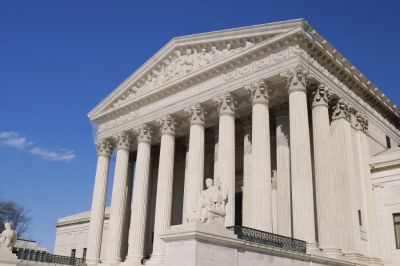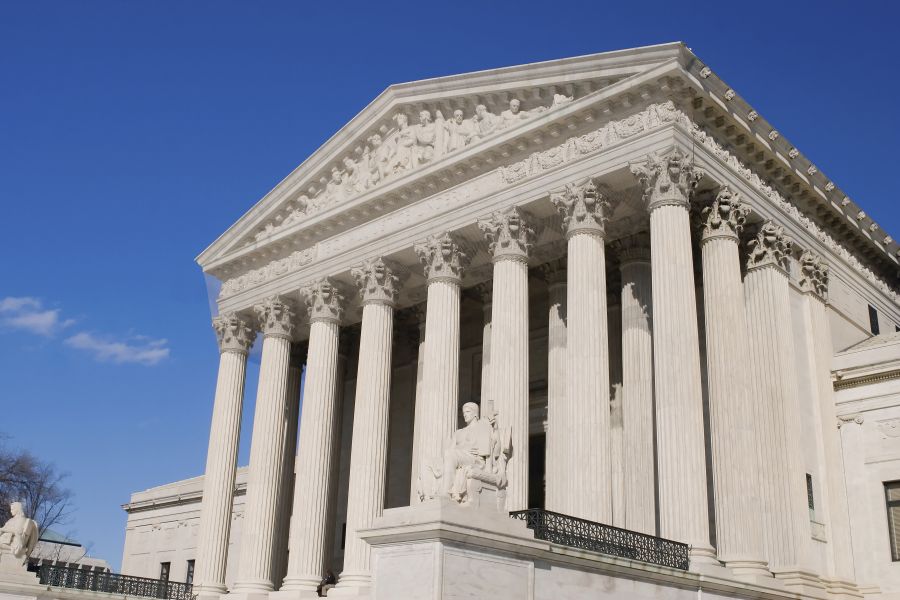Four key First Amendment cases to watch this Supreme Court term
First Five by the Freedom Forum Institute
Oct 7, 2021

Download Word doc here.
The Supreme Court’s October 2021 term, which officially began on the first Monday of the month, promises to be an eventful one for those concerned about the First Amendment and its freedoms. The court will hear cases involving:
- A man on death row asserting a violation of his religious liberty rights;
- A dispute over whether a college system’s censure is a permissible exercise or a retaliatory act;
- Whether a Texas city can treat digital signs differently on the premises of businesses; and
- A school choice program that bars tuition assistance to parents who send their kids to religious schools.
These decisions will afford the justices an opportunity to explain the contours of religious liberty and to explore the reaches or limitations of important First Amendment free-speech principles, such as the government speech doctrine and the content discrimination principle.
Let’s take a closer look at the First Amendment cases on the court’s docket.
RAMIREZ V. COLLIER: RELIGIOUS LIBERTY VIOLATED ON DEATH ROW?
On Nov. 1, the court will hear the case of John H. Ramirez, who was convicted of killing a convenience store clerk during a robbery. Ramirez is arguing that his religious liberty rights were violated when the state of Texas prohibited his pastor from laying his hands on him and from audibly praying and singing in the execution chamber. The state argues the restrictions are necessary for security.
Ramirez was set to be executed in early September, but the court granted a temporary stay to hear this appeal.
The appeal focuses on whether Ramirez adequately exhausted his remedies under the Prison Litigation Reform Act. But the court also specifically asked lawyers in the case to discuss whether Ramirez adequately showed that the actions of Texas officials in limiting his pastor substantially burdened Ramirez’s religious liberty rights under the Religious Land Use and Institutionalized Persons Act (RLUIPA).
HOUSTON COMMUNITY COLLEGE SYSTEM V. WILSON: CAN GOVERNMENT BODIES FREELY CENSURE MEMBERS WITHOUT FIRST AMENDMENT CONSTRAINTS?
The next day, Nov. 2, the court will hear arguments in Houston Community College System v. Wilson, which examines whether the First Amendment is violated when an elected board censures one of its members for critical speech. David Wilson, who served on Houston Community College System’s board of trustees, alleged that his fellow board members censured him in retaliation for his protected speech.
The college contends that throughout American history, elected bodies have censured their own members. In First Amendment law, the government often is prohibited from discriminating against private speakers because of their speech — but the government can also speak and take its own positions. It often is difficult to determine when the government is discriminating against private speakers or engaging in so-called government speech. In this case, the court could further explain or limit the reach of the government speech doctrine.
Government speech doctrine: If the government is considered the actual speaker, then the government can speak and regulate largely immune from First Amendment scrutiny.
CITY OF AUSTIN, TEXAS V. REAGAN NATIONAL ADVERTISING OF TEXAS, INC: ARE SIGN PLACEMENT RULES CONTENT DISCRIMINATION?
On Nov. 10, the court will hear arguments in City of Austin v. Reagan National Advertising of Texas, a case that deals with digital signs. The City of Austin allows digital signs on the premises of a business, but not off premise.
An advertising company argues that the city’s disparate treatment of on-premise and off-premise signs amounts to content discrimination impermissible under the First Amendment.
The court ruled in Reed v. Town of Gilbert (2015) that an Arizona town’s sign ordinance violated the First Amendment when it imposed different restrictions on political signs, ideological signs and so-called temporary directional signs. Justice Clarence Thomas reasoned that because the sign ordinance treated signs differently, it was a content-based law subject to strict scrutiny — the highest form of judicial review.
Justice Elena Kagan agreed that the Arizona ordinance violated the First Amendment but warned that an overly strict application of the content discrimination principle could turn the court into “a veritable Supreme Board of Sign Review.”
The Texas case gives the justices an opportunity to determine the reach of its reasoning in Reed and the content discrimination principle.
CARSON V. MAKIN: CAN STATES BAR FUNDS FOR PARENTS WHO SEND THEIR CHILDREN TO RELIGIOUS SCHOOLS?
On Dec. 8, the court will hear arguments in Carson v. Makin to determine the constitutionality of a tuition assistance program in Maine that prohibits the state from aiding students who attend secondary schools that are classified as sectarian. The Maine Department of Education examines schools to determine whether they are sectarian or not.
The problem is that many students in Maine live in districts that do not operate a public secondary school. The Carson family lives in such a district; the children attend a private religious school, the Bangor Christian School. However, the Carsons cannot receive any tuition reimbursement because Bangor is considered sectarian.
The group suing on behalf of the Carsons and another family contends that this sectarian exclusion violates both the Free Exercise and Establishment clauses of the First Amendment: “There is a longstanding, entrenched split among the Courts of Appeals and state courts of last resort on whether government may bar participants in student aid programs from choosing to use their benefit to attend schools that provide religious instruction.”
The court in recent years seems to view such exclusions with suspicion. For example, in Espinoza v. Montana Department of Revenue (2020) the court invalidated a Montana rule that barred scholarship funds from being used for students attending parochial schools. The court reasoned that the Montana rule unconstitutionally discriminates based on religious status.
This case provides the justices with an opportunity to clarify whether such differential treatment of religious schools violates the Free Exercise Clause rights of those who wish to attend such schools and still obtain the governmental benefits provided to those who attend secular schools.
For updates on these and other key First Amendment court cases as they are heard, sign up for the weekly First Five newsletter.
David L. Hudson Jr. is a First Amendment fellow of the Freedom Forum and law professor at Belmont University who publishes widely on First Amendment topics. He is the author of several First Amendment books, including “Let The Students Speak!: A History of the Fight for Freedom of Expression in American Schools” (2011).










